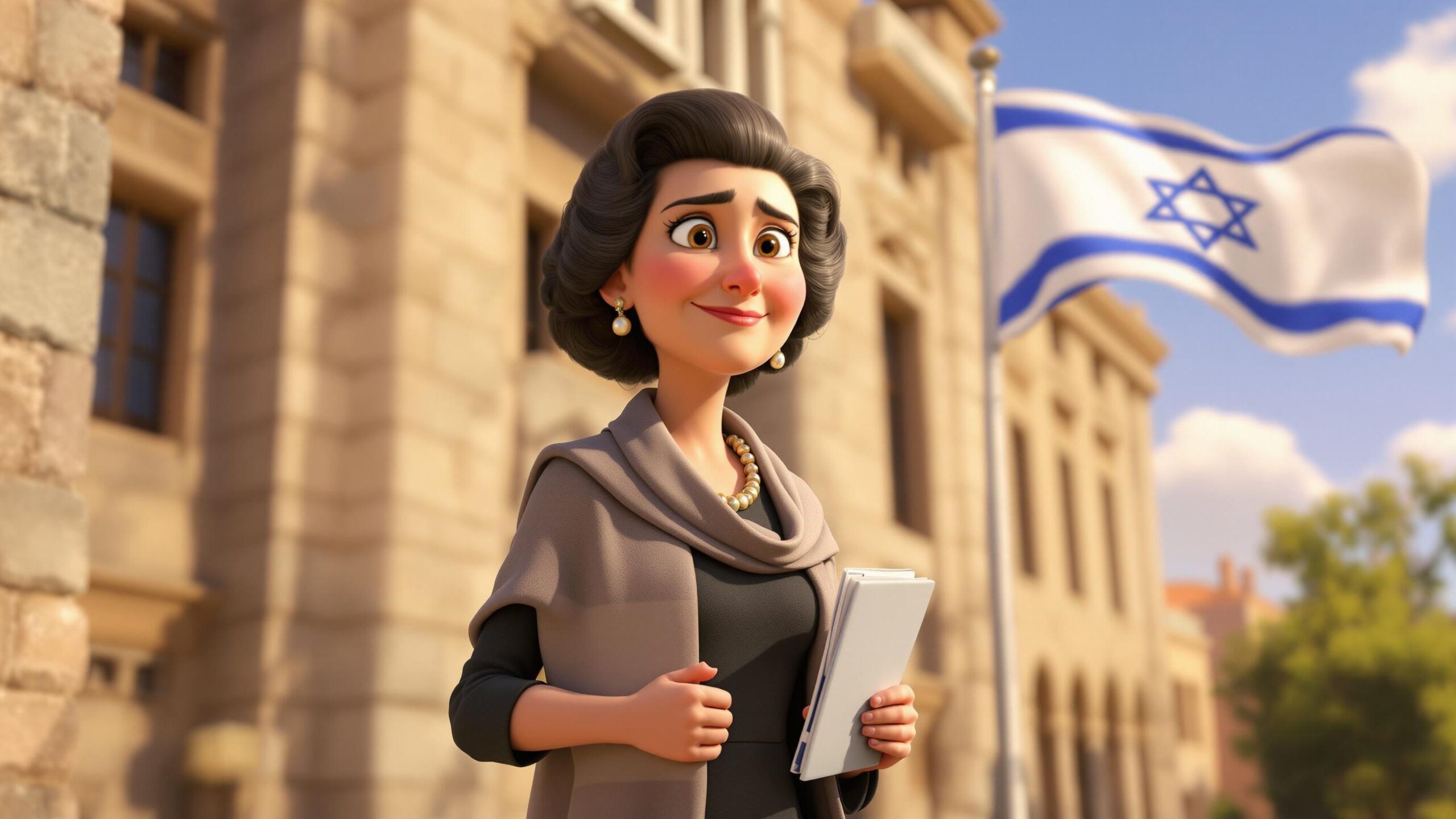In a world of polished speeches and staged smiles, Golda Meir was refreshingly blunt. Dubbed the “Iron Lady” of Israeli politics long before the phrase became synonymous with Margaret Thatcher, Golda didn’t rise to power through charm or charisma—she climbed there with grit, conviction, and a no-nonsense attitude. As the first—and so far, only—female Prime Minister of Israel, she wasn’t just a leader; she was a force. She held power in a time of extraordinary tension, from the shadows of the Holocaust to the battles of the Yom Kippur War. Her journey from a poor girl in Kyiv to the top of Israeli politics is a testament to resilience and fierce patriotism. This is the story of a woman who never set out to be famous, but who became unforgettable all the same.
From Kyiv to Milwaukee: A Childhood in Motion
Golda Meir was born Golda Mabovitch on May 3, 1898, in Kyiv, in what was then part of the Russian Empire. Life wasn’t easy. Her early memories were shaped by poverty, fear of pogroms, and cramped living conditions. These hardships planted the seeds of her lifelong determination to find a better, safer world for Jewish people. When she was eight years old, her family immigrated to the United States, settling in Milwaukee, Wisconsin. It was in the heart of the American Midwest that Golda’s fire for social justice and activism was kindled. She wasn’t like the other kids. While most children were content with games and play, young Golda was organizing fundraisers and forming clubs to support classmates who couldn’t afford textbooks. Her love of learning was fierce, and her belief in Zionism—a homeland for the Jewish people—took root early, sparked by conversations at home and reinforced by her political awakening in school. Though her parents hoped she’d follow a more traditional path, Golda had other ideas. She was hungry for action, equality, and purpose. After high school and teacher training college, she joined a Zionist youth movement and in 1921, made aliyah—immigrating to what was then British Mandate Palestine—with her husband Morris Meyerson. It was a bold move for a young couple with almost no money, but for Golda, it was destiny.
Building the Dream: Kibbutz Life and Political Beginnings
Golda’s early years in Palestine were a whirlwind of hard labor and even harder ideals. She joined Kibbutz Merhavia, where she worked in the chicken coops, kitchen, and fields. It was tough work—blistered hands, long days under the sun—but Golda relished it. She believed in the dream of a homeland being built with sweat, unity, and socialist values. It was in this world of collective living and Zionist fervor that she first made her mark. She quickly rose in leadership, known for her sharp intelligence and tireless energy. Her oratory skills were direct, heartfelt, and impossible to ignore. Unlike many of her male counterparts, she didn’t dress up her words in metaphor. She spoke plainly—and that became her trademark. By the 1930s, Golda was a rising star in the Histadrut (the labor federation) and the Mapai party. During World War II and the Holocaust, she became one of the loudest voices urging world powers to help Europe’s endangered Jews. After the war, she played a crucial role in organizing illegal Jewish immigration to Palestine, in defiance of British quotas. She wasn’t just part of the Zionist movement—she was one of its fiercest champions.
Signing a Nation into Being
In May 1948, when David Ben-Gurion declared the independence of Israel, Golda was one of only two women to sign the Declaration of Independence. By then, she had already raised millions of dollars in the United States to fund Israel’s fight for survival—a feat that earned her admiration and solidified her role in Israel’s founding. After independence, Golda served in a range of critical positions. She became Israel’s first ambassador to the Soviet Union in 1948, where she was met by massive crowds of Soviet Jews longing to see a representative from the new Jewish state. Later, as Minister of Labor, she helped build housing for hundreds of thousands of new immigrants. As Foreign Minister, she emphasized aid to developing countries and refused to play politics with Israel’s existence. She even Hebraized her name—dropping Meyerson in favor of Meir, meaning “illuminates”—a symbolic gesture of her deep commitment to the new state. Through every role, she maintained her simple lifestyle, chain-smoking and serving tea to visiting diplomats as if she were still hosting neighbors in Milwaukee.
Becoming Prime Minister: Reluctant but Resolute
In 1969, after Prime Minister Levi Eshkol’s sudden death, the Labor Party needed a consensus figure to lead the nation. The party was fractious, and no one candidate stood out. Enter Golda Meir. At 70 years old, she wasn’t the most obvious choice—but she was widely respected, deeply experienced, and seen as a unifying presence. Golda didn’t want the job. She reportedly asked, “Do I look like a prime minister?” Yet her sense of duty outweighed her hesitation, and she stepped into the role with her usual blend of pragmatism and unshakeable will. Her tenure came during a turbulent time in Israeli history. Peace was elusive, war was always on the horizon, and the nation’s politics were increasingly polarized. Yet Golda navigated it all with the stoicism of a survivor and the heart of a true believer in the Zionist cause. She met with world leaders, including U.S. President Nixon, and fiercely defended Israel’s right to exist and protect itself.
The Yom Kippur War and a Leadership Tested
Golda Meir’s legacy is most closely tied to the Yom Kippur War of 1973. On October 6, Egyptian and Syrian forces launched a surprise attack on Israel during the holiest day in the Jewish calendar. The early days of the war were brutal—Israel was caught off-guard, and casualties mounted quickly. Despite the devastation, Golda didn’t flinch. She convened the cabinet, listened to generals, and made the gut-wrenching decisions required of a wartime leader. Her determination to not let Israel fall on her watch was unwavering. She authorized a full mobilization and reached out to the United States for emergency support—an appeal that led to a massive airlift of weapons and supplies. Eventually, Israel pushed back and regained territory, but the psychological toll was deep. The war shattered the nation’s sense of invincibility. While many praised Golda’s steady hand, others criticized the intelligence failures leading up to the war. Protests followed. The Agranat Commission cleared her of personal blame but the political damage was done. In 1974, weary and criticized, Golda resigned. She was 75 and had given her all. She left office with humility, saying, “You cannot govern the people without love.” It was a simple truth from a woman who had never cared for politics as a game, but as a responsibility.
The Woman Behind the Legend
Golda Meir was never glamorous. She didn’t care about designer clothes or polished appearances. Her power came from authenticity. She brewed her own coffee during cabinet meetings, wrote speeches by hand, and lived in a modest apartment even as Prime Minister. She called herself a “Jewish grandmother,” but one with nerves of steel and a passport packed with stamps. She was a paradox—deeply maternal and yet stern, progressive on social issues but a hawk on security. She was skeptical of feminism as a movement, yet her life became one of its most enduring examples. She often said she wasn’t a woman in politics, just a politician. But by simply being who she was, she became a feminist icon—especially in a region where women rarely led nations.
Legacy of a Political Powerhouse
Golda Meir passed away in 1978, just four years after resigning from office. Her funeral was attended by dignitaries from around the world, and her grave at Mount Herzl remains a site of quiet homage. She left behind no scandals, no fortune, no air of self-importance—just a legacy of unwavering leadership during some of Israel’s darkest hours. To this day, she remains the only woman to have led Israel. Her portrait hangs in government buildings, her words quoted in political debates, her life studied in schools. Though some criticize her for her hardline stances or the intelligence lapses of the Yom Kippur War, even her detractors admit: she was one of a kind. Golda Meir once famously said, “Trust yourself. Create the kind of self that you will be happy to live with all your life.” And that’s exactly what she did.
The Straight-Talking Matriarch of Israel
Golda Meir didn’t seek greatness—she earned it. Through grit, service, and steadfast belief in her people, she became not just Israel’s first female Prime Minister, but its most beloved political matriarch. She was a mother figure, a wartime commander, a diplomat with dirt on her shoes, and a woman who taught the world that strength isn’t in your voice, your dress, or your charm—it’s in your character. Her story is the story of Israel’s birth, struggle, and survival. In her stubbornness, people saw strength. In her simplicity, they saw sincerity. And in her leadership, they saw the soul of a nation still fighting to exist. She once joked, “Let me tell you something that we Israelis have against Moses. He took us 40 years through the desert in order to bring us to the one spot in the Middle East that has no oil!” Yet it wasn’t oil that fueled her legacy—it was resolve, and the unshakable belief that her people belonged. And thanks to her, they stayed.




